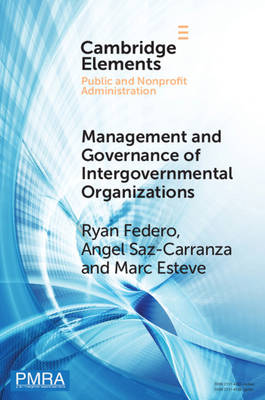
- Afhalen na 1 uur in een winkel met voorraad
- Gratis thuislevering in België vanaf € 30
- Ruim aanbod met 7 miljoen producten
- Afhalen na 1 uur in een winkel met voorraad
- Gratis thuislevering in België vanaf € 30
- Ruim aanbod met 7 miljoen producten
Zoeken
Management and Governance of Intergovernmental Organizations
Ryan Federo, Angel Saz-Carranza, Marc Esteve
€ 31,95
+ 63 punten
Omschrijving
What happens to intergovernmental organizations (IGOs) after their creation has remained in mystery over the years. Although the current globalized outlook has sparked new and growing interests on the role that IGOs play in the global landscape, the scholarship has largely focused on the political aspects of cooperation, primarily on how and why different IGO member states interact with each other and the outcomes associated with such cooperation. Research is yet to untangle how these organizations work and operate. This Element addresses this niche in the literature by delving into two important aspects: the management and governance of IGOs. We build on a four-year research program where we have collected three types of different data and produced several papers. Ultimately, the Element seeks to provide scholars with a description of the inner workings of IGOs, while providing guidance to policymakers on how to manage and govern them.
Specificaties
Betrokkenen
- Auteur(s):
- Uitgeverij:
Inhoud
- Aantal bladzijden:
- 75
- Taal:
- Engels
- Reeks:
Eigenschappen
- Productcode (EAN):
- 9781108827591
- Verschijningsdatum:
- 7/01/2021
- Uitvoering:
- Paperback
- Formaat:
- Trade paperback (VS)
- Afmetingen:
- 152 mm x 229 mm
- Gewicht:
- 108 g

Alleen bij Standaard Boekhandel
+ 63 punten op je klantenkaart van Standaard Boekhandel
Beoordelingen
We publiceren alleen reviews die voldoen aan de voorwaarden voor reviews. Bekijk onze voorwaarden voor reviews.











